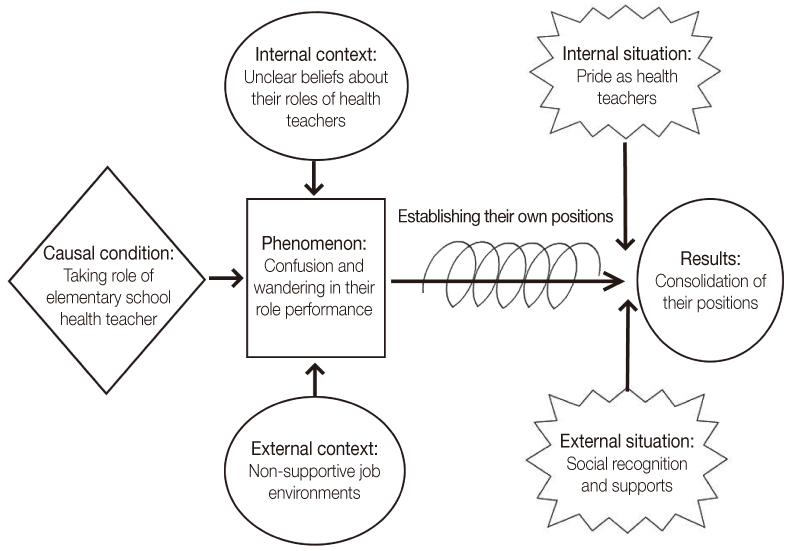J Korean Acad Nurs.
2014 Jun;44(3):305-316. 10.4040/jkan.2014.44.3.305.
Role Adaptation Process of Elementary School Health Teachers: Establishing Their Own Positions
- Affiliations
-
- 1Kumsa Elementary School, Busan, Korea.
- 2College of Nursing, Keimyung University, Daegu, Korea. lbs@kmu.ac.kr
- KMID: 1796155
- DOI: http://doi.org/10.4040/jkan.2014.44.3.305
Abstract
- PURPOSE
The purpose of this study was to explore and identify patterns from the phenomenon of the role adaptation process in elementary school health teachers and finally, suggest a model to describe the process.
METHODS
Grounded theory methodology and focus group interviews were used. Data were collected from 24 participants of four focus groups. The questions used were about their experience of role adaptation including situational contexts and interactional coping strategies. Transcribed data and field notes were analyzed with continuous comparative analysis.
RESULTS
The core category was 'establishing their own positions', an interactional coping strategy. The phenomenon identified by participants was confusion and wandering in their role performance. Influencing contexts were unclear beliefs for their role as health teachers and non-supportive job environments. The result of the adaptation process was consolidation of their positions. Pride as health teachers and social recognition and supports intervened to produce that result. The process had three stages; entry, growth, and maturity.
CONCLUSION
The role adaptation process of elementary school health teachers can be explained as establishing, strengthening and consolidating their own positions. Results of this study can be used as fundamental information for developing programs to support the role adaptation of health teachers.
Keyword
MeSH Terms
Figure
Cited by 3 articles
-
The Job Experience of Oncology Nurse Specialists
Young Sook Tae, Suhye Kwon, Young Sook Lee
Asian Oncol Nurs. 2014;14(4):236-248. doi: 10.5388/aon.2014.14.4.236.The Emergency Care Experience and Demand for Support of School Nurse
Jae Hee Yoon, In Sook Lee
J Korean Acad Community Health Nurs. 2017;28(2):182-195. doi: 10.12799/jkachn.2017.28.2.182.Adjusting Process of Nurses to an Oriental Medical Unit
Mee-Hun Lee, Hyoung-Sook Park, Jae-Hyun Ha
Korean J Adult Nurs. 2017;29(6):615-625. doi: 10.7469/KJAN.2017.29.6.615.
Reference
-
1. Kwon SJ, Kim NH, Kim YH, Park NH, Yang M, Lee KH, et al. School health. Paju: Soomoonsa;2010.2. Kim MH. A study of the relation between self-concept of profession and duty satisfaction of school health nurse [master's thesis]. Seoul: Kyung Hee University;2000.3. Ministry of Education. Job training guide: An expectant of new regulation appointment [Internet]. Seoul: Author;2013. cited 2014 March 28. Available from: http://www.mest.go.kr/newsearch/search.jsp.4. Lee JH, Lee BS. Self role perception of health teachers in elementary schools. J Korean Acad Community Health Nurs. 2010; 21(4):398–408. http://dx.doi.org/10.12799/jkachn.2010.21.4.398.5. Libbus MK, Bullock LFC, Brooks C, Igoe J, Beetem N, Cole M. School nurses: Voices from the health room. J Sch Health. 2003; 73(8):322–324. http://dx.doi.org/10.1111/j.1746-1561.2003.tb06590.x.6. Park JZ, Jung MS. A study of school nursing activity performed by school nurses and teachers holding additional school health. J Korea Community Health Nurs Acad Soc. 1995; 9(1):17–32.7. Jung GS, Ahn SH, Chung ES. Role expectation and roe performance for school health educator as elementary school students recognize. J Korean Soc Sch Health. 2003; 16(2):125–134.8. Stern PN. Grounded theory methodology: Its uses and processes. Image (IN). 1980; 12(1):20–23. http://dx.doi.org/10.1111/j.1547-5069.1980.tb01455.x.9. Morgan DL. S Kim SE Oh Y Eun HM Son M Yi . Focus groups as qualitative research. 2nd ed. Thousand Oaks, CA: Sage Publication, Inc.;1997.10. Burden PR. Implications of teacher career development: New roles for teachers, administrators and professors. Action Teach Educ. 1982; 4(3-4):21–26. http://dx.doi.org/10.1080/01626620.1982.10519117.11. Unruh A, Turner HE. Supervision for change and innovation. Boston, MA: Houghton Mifflin;1970.12. Strauss A, Corbin J. Basics of qualitative research: Techniques and procedures for developing grounded theory. 2nd ed. London, UK: Sage Publications, Inc.;1998.13. Sandelowski M. The problem of rigor in qualitative research. ANS Adv Nurs Sci. 1986; 8(3):27–37.14. Son HM, Koh MH, Kim CM, Moon JH. The clinical experiences of adaptation as a new nursing staff. J Korean Acad Nurs. 2001; 31(6):988–997.15. Kim KK, Yun B, Jeon MS. The effects of school health teachers' self-efficacy on job satisfaction. J Educ Res. 2011; 9(2):22–42.16. Park YS, Lee HK, Hong HM. Job-satisfaction of school health (yang ho) teachers in Korea. J Korean Soc School Health Educ. 2000; 1(2):17–27.17. Benner P. From novice to expert, excellence and power in clinical nursing practice. Menlo Park, CA: Addison-Wesley Publishing Company;1984.18. Kang SY. The role adaptation process in head nurses [dissertation]. Seoul: Seoul National University;2003.19. Huberman M. The lives of teachers. New York, NY: Teachers College Press;1993.20. Keller T, Ryberg JW. A differentiated practice model for school nursing. J Sch Nurs. 2004; 20(5):249–256.21. Kim SH, Jo MW, Lee SI. Psychometric Properties of the Korean Short Form-36 Health Survey Version 2 for Assessing the General Population. Asian Nurs Res. 2013; 7(2):61–66.
- Full Text Links
- Actions
-
Cited
- CITED
-
- Close
- Share
- Similar articles
-
- Self Role Perception of Health Teachers in Elementary Schools
- Comparison of Elementary School Teachers and Students on Demands for Safety Education
- DACUM Job Analysis on Elementary Health Teachers' Roles
- First aid knowledge and educational needs related to maxillofacial trauma among elementary school teachers in Jeollabuk-do
- A Study on Elementary School Teacher's Status and Recognition of Nutrition Education in Incheon


